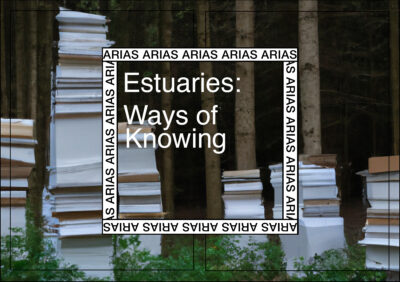Estuaries: Ways of Knowing
Through exchanging words, images and possible other mail attachments, ARIAS wondered within its network what were the shifting grounds in research and more precisely in its resources. ‘Ways of knowing’ are evolving through disturbing the dominant hierarchies of knowledge creation and circulation. Research is reinventing itself from today’s urgencies of having multiple voices within the common discourse. What is considered known, especially within academic frameworks, to still be thought through non-dominant and non-Western ideologies? The creation of knowledge has excluded multiple voices while appropriating and studying them in a colonial approach. Truth is ambiguous, and it can be manipulated and countered. Truth doesn’t exist in a finalised state, yet it is rather an endless process of incertitude that exists out of many possible truths. This opens up research to being revisited, questioned and studied over and over again. Knowledge circulated around and within universities is being questioned by different perspectives than the one who has created them.
By leaving the word to the ARIAS network, the foundation of Estuaries is set on dialogue processes. ARIAS reflected on what the future of knowledge looked like and how those urgencies resurge in research fields. Asking questions, with multiple or no answers possible, mapped out the steady streams of knowledge circulation. ARIAS was inspired by the research inquiry developed by philosophers Vinciane Despret and Isabelle Stengers in their book Women Who Make A Fuss (2014). In this book, the philosophers posed: ‘which question would you ask women’ rather than posing questions beginning with ‘as women…’, which welcomed a much more active reflexive state from which to enter the dialogue. Using this example as inspiration, ARIAS then initiated an e-mail conversation on the evaluation of ‘what we think we know’ and ‘how we think we know it’ and attempts to position these responses within art, sciences and research.
By investigating first on a more personal level through conversations, ARIAS invited artists and researchers to exchange their struggles and questions with each other. Through the e-mail format, images and sound were included and focused on the written thoughts rather than on speech. Rather than requesting their approach to knowledge, the network was then asked to wonder what questions should be asked to other researchers. The conversations also developed on encounters with knowledge through other situations outside of an academic framework such as personal, random, or by chance inquiries.


